23912and 24912 Sunday and Monday LESSON 708 FREE ONLINE eNālāndā Research and Practice UNIVERSITY through http://sarvajan.ambedkar.org Dhammapada Verses 356, 357, 358 and 359 Ankura Vatthu-Verse
356. Those Without The Bane Of Passion-Verse 357. Those Without The
Bane Of Ill-Will-Verse 358. Those Without The Bane Of Illusion-Verse
359. Those Without The Bane Of Greed-Dhammapada Verses 360 and 361 Pancabhikkhu Vatthu-Verse 360. Sense Discipline-Verse 361. Suffering End With All-Round Discipline
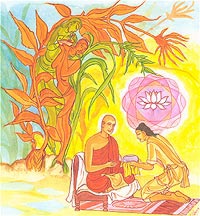 |
Verse 356. Those Without The Bane Of Passion
Explanation: Fields have grasses as their bane. The ordinary |
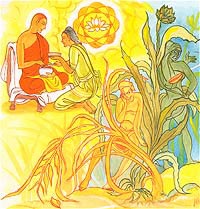 |
Verse 357. Those Without The Bane Of Ill-Will
Explanation: Fields have weeds as their bane. The ordinary |
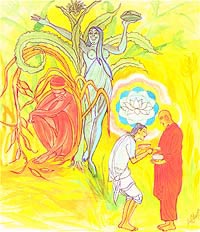 |
Verse 358. Those Without The Bane Of Illusion
Explanation: Fields have weeds as their bane. |
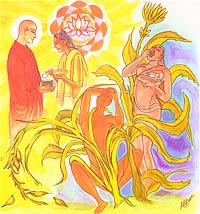 |
Verse 359. Those Without The Bane Of Greed
Explanation: Fields have weeds as their bane. |
Dhammapada Verses 356, 357, 358 and 359
Ankura VatthuTinadosani khettani
ragadosa ayam paja
tasma hi vitaragesu
dinnam hoti mahapphalam.Tinadosani khettani
dosadosa ayam paja
tasma hi vitadosesu
dinnam hoti mahapphalam.Tinadosani khettani
mohadosa ayam paja
tasma hi vitamohesu
dinnam hoti mahapphalam.Tinadosani khettani
icchadosa ayam paja
tasma hi vigaticchesu
dinnam hoti mahapphalam.Verse 356: Weeds damage fields; lust spoils all beings. Therefore, giving to
those free from lust yields great benefit.Verse 357: Weeds damage fields; ill will spoils all beings. Therefore, giving
to those free from ill will yields great benefit.Verse 358: Weeds damage fields; ignorance spoils all beings. Therefore,
giving to those free from ignorance yields great benefit.Verse 359: Weeds damage fields; covetousness spoils all beings. Therefore,
giving to those free from covetousness yields great benefit.
The Story of Deva Ankura
While on a visit to the Tavatimsa deva realm, the Buddha uttered Verses (356)
to (359) of this book, with reference to a deva named Ankura.The Buddha visited the Tavatimsa deva realm to expound the Abhidhamma to Deva
Santusita, who had been his mother. During that time, there was a deva named
Indaka in Tavatimsa. Indaka, in his last existence as a man, had offered a
little alms-food to Thera Anuruddha. As this good deed was made to a thera
within the period of the Buddha’s Teaching he was amply rewarded for it. Thus,
on his death he was reborn in the Tavatimsa realm and was lavishly bestowed with
the luxuries of the deva world. At that time, there was also another deva by the
name of Ankura in Tavatimsa who had given much in charity; in fact, many times
more than what Indaka had given. But his charity was made outside the period of
the Teaching of any of the Buddhas. So, in spite of his lavish and grand
charities, he was enjoying the benefits of the life of a deva on a much smaller
scale than Indaka, who had offered very little. As the Buddha was then at
Tavatimsa, Ankura asked him the reason for the discrepancy in gaining the
benefits. To him the Buddha answered, “O deva! When giving charities
and donations you should choose whom you give, for acts of charities are just
like seeds. Seeds put into fertile soil will grow into strong, vigorous plants
or trees and will bear much fruit; but you had sown your seed in poor soil, so
you reap poorly.”Then the Buddha spoke in verse as follows:
Verse 356: Weeds damage fields; lust spoils all
beings. Therefore, giving to those free from lust yields great
benefit.Verse 357: Weeds damage fields; ill will spoils
all beings. Therefore, giving to those free from ill will yields great
benefit.Verse 358: Weeds damage fields; ignorance spoils
all beings. Therefore, giving to those free from ignorance yields
great benefit.Verse 359: Weeds damage fields; covetousness
spoils all beings. Therefore, giving to those free from covetousness
yields great benefit.
End of Chapter Twenty-four: Craving
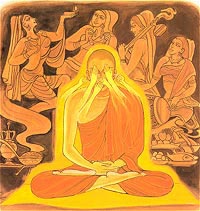 |
Verse 360. Sense Discipline
Explanation: It is good to be disciplined in the eye. It is |
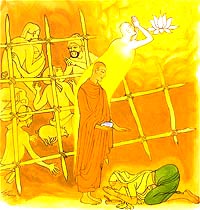 |
Verse 361. Suffering End With All-Round Discipline
Explanation: It is good to be disciplined in body. It is good |
Dhammapada Verses 360 and 361
Pancabhikkhu Vatthu
Cakkhuna samvaro sadhu
sadhu sotena samvaro
ghanena samvaro sadhu
sadhu jivhaya sarmvaro.
Kayena samvaro sadhu
sadhu vacaya samvaro
manasa samvaro sadhu
sadhu sabbattha samvaro
sabattha sambuto bhikkhu
sabbadukkha pamuccati.
Verse 360: Restraint
in the eye is good, good is restraint in the ear; restraint in the nose is good,
good is restraint in the tongue.
Verse 361: Restraint in body is good, good is
restraint in speech; restraint in mind is good, good is restraint in all the
senses. A bhikkhu restrained in all the senses is freed from all ills (Samsara
dukkha).
The Story of Five Bhikkhus
While residing at the Jetavana
monastery, the Buddha uttered Verses (360) and (361) of this book, with
reference to five bhikkhus.
Once there were five bhikkhus in
Savatthi. Each of them practised restraint of just one out of the five senses
and each of them claimed that what he was practising was the most difficult.
There were some heated arguments over this and they could not come to an
agreement. Finally, they went to the Buddha to ask for his decision. The Buddha
said to them, “Each of the senses is just as difficult to control as the
other; but all bhikkhus must control all the five senses and not just one. Only
those who control all the senses would escape from the round of rebirths.”
Then the Buddha spoke in verse as
follows:
|
Verse 360: Restraint |
|
Verse 361: Restraint |
Thus have I heard:
On one occasion the Blessed One was living near Savatthi at Jetavana
at Anathapindika’s monastery. Then in the forenoon the Blessed One
having dressed himself, took bowl and (double) robe, and entered the
city of Savatthi for alms. Now at that time a fire was burning, and an
offering was being prepared in the house of the brahman
Aggikabharadvaja. Then the Blessed One, while on his alms round, came to
the brahman’s residence. The brahman seeing the Blessed One some way
off, said this: “Stay there, you shaveling, stay there you wretched
monk, stay there you outcast.” When he spoke thus the Blessed One said
to the brahman: “Do you know, brahman, who an outcast is and what the
conditions are that make an outcast?” “No, indeed, Venerable Gotama, I
do not know who an outcast is nor the conditions that make an outcast.
It is good if Venerable Gotama were to explain the Dhamma to me so that I
may know who an outcast is and what the conditions are that make an
outcast.”[1]
“Listen then, brahman, and pay attention, I will speak.”
“Yes, Venerable Sir,” replied the brahman.
1. “Whosoever is angry, harbors hatred, and is reluctant to speak
well of others (discredits the good of others), perverted in views,
deceitful — know him as an outcast.
2. “Whosoever in this world kills living beings, once born or twice born,[2] in whom there is no sympathy for living beings — know him as an outcast.
3. “Whosoever destroys and besieges villages and hamlets and becomes notorious as an oppressor — know him as an outcast.
4. “Be it in the village, or in the forest, whosoever steals what
belongs to others, what is not given to him — know him as an outcast.
5. “Whosoever having actually incurred a debt runs away when he is
pressed to pay, saying, ‘I owe no debt to you’ — know him as an outcast.
6. “Whosoever coveting anything, kills a person going along the road,
and grabs whatever that person has — know him as an outcast.
7. “He who for his own sake or for the sake of others or for the sake
of wealth, utters lies when questioned as a witness — know him as an
outcast.
8. “Whosoever by force or with consent associates with the wives of relatives or friends — know him as an outcast.
9. “Whosoever being wealthy supports not his mother and father who have grown old — know him as an outcast.
10. “Whosoever strikes and annoys by (harsh) speech, mother, father,
brother, sister or mother-in-law or father-in-law — know him as an
outcast.
11. “Whosoever when questioned about what is good, says what is
detrimental, and talks in an evasive manner- know him as an outcast.
12. “Whosoever having committed an evil deed, wishes that it may not
be known to others, and commits evil in secret — know him as an outcast.
13. “Whosoever having gone to another’s house, and partaken of choice
food, does not honor that host by offering food when he repays the
visit — know him as an outcast.
14. “Whosoever deceives by uttering lies, a brahman or an ascetic, or any other mendicant — know him as an outcast.
15. “Whosoever when a brahman or ascetic appears during mealtime
angers him by harsh speech, and does not offer him (any alms) — know him
as an outcast.
16. “Whosoever in this world, shrouded in ignorance, speaks harsh words (asatam) or falsehood[3] expecting to gain something — know him as an outcast.
17. “Whosoever debased by his pride, exalts himself and belittles other — know him as an outcast.
18. “Whosoever is given to anger, is miserly, has base desires, and
is selfish, deceitful, shameless and fearless (in doing evil) — know him
as an outcast.
19. “Whosoever reviles the Enlightened One (the Buddha), or a
disciple of the Buddha, recluse or a householder — know him as an
outcast.
20. “Whosoever not being an arahant, a Consummate One, pretends to be
so, is a thief in the whole universe — he is the lowest of outcasts.
21. “Not by birth is one an outcast; not by birth is one a brahman.
By deed one becomes an outcast, by deed one becomes a brahman.
22. “Know ye by the example I now cite (the fact that by birth one is
not an outcast). There was an outcast’s son, Sopaka, who became known
as Matanga.
23. “This Matanga attained the highest fame so difficult to gain. Many were the warriors (kshatriyas) and brahmans who went to attend on him.
24. “Mounting the celestial chariot (the Noble Eightfold path, and
driving) along the passion-free high road, (Sopaka, now a monk), reached
the Brahma realm having given up sense desires.
25. “His (lowly) birth did not prevent him from being reborn in the
Brahma realm. There are brahmans born in the family of preceptors,
kinsmen of (veda) hymns.
26. “They are often seen committing evil deeds. In this life itself
they are despised, in the next they are born in an evil state of
existence. High birth does not prevent them from falling into a woeful
state, or from censure.
27. “Not by birth is one an outcast; not by birth is one a brahman.
By deed one becomes an outcast, by deed one becomes an brahman.”
When the Buddha had thus spoken, the Brahman Aggikabharadvaja said to
the Blessed One: “Excellent, O Venerable Gotama, excellent! Just as, O
Venerable Gotama, a man were to set upright what had been overturned, or
were to reveal what had been hidden, or were to point the way to one
who had gone astray, or were to hold an oil lamp in the dark so that
those with eyes may see things, even so in many ways has the Venerable
Gotama expounded the Dhamma, the doctrine. I take refuge in the
Venerable Gotama, the Dhamma, and the Sangha, the Order. May the
Venerable Gotama accept me as a lay follower who has taken refuge from
this day onwards while life lasts.”
Notes
- 1.
- The abusive terms used by the brahman and the respectful address
that follows need a word of explanation. The brahman had just prepared
his offering to the great Brahma, his God, when his eyes fell on Buddha.
To the brahman the sight of a samana, a shaven-headed recluse,
was an unlucky sign. Hence he burst into angry words. The Buddha,
however, was unruffled and spoke to him quietly in words of soft
cadence. The brahman apparently was ashamed, and repenting of his folly,
addressed the Buddha courteously. Comy. It is interesting to note the
Buddha’s stress on anger and hatred in his very first stanza. - 2.
- dvijam, birds. Twice-born is a reference to birds since they first come out as an egg, and when hatched a complete bird is born.
- 3.
- asantamtipi patho, SnA.
Babu Jagjivan Ram, a first class first in academics was far better than
Indira Gandhi. But he was denied PM’s post by the congress. Babuji said that” I
may be the Dy. Prime Minister of this country. But my cook and my chapprasi
feel that I am inferior to them by caste. Even the Janatha Party formed by Jan Sangh, today’s
BJP just made drama as though they wanted to Make Babuji as PM. But in reality
they let him down. Babuji was no way inferior to Vajpayee. They could have made
him as thge PM instead of shedding crocodile tears for SC/STs. Now the Cook Jathis (meaning birth, lump, mass, white,
black, rich, poor, middle class and so on), are shedding crocodile tears through some
created dummies for the sake of votes. These dummies cannot become real nor the
chelas(carry bags ) become the contents nor the Chamchaas (spoons) become the
eatables. They will just be puniyas and Sanje (evening swines) of the ruling
Jathis who will be comfortable in drainages thinking that they ARE HEAVENS.The
traditional venomous full of hatred and anger mad manush jathi that was
responsible for creation of the so
called different colours of first rate, 2nd,3rd,4th
rate jathis and 22.5% population without any soul, so that they could do any
harm they wished to do to them. Though some 15% of 2nd and 3rd
rate jathis accepted the 1st rate jathi as supreme. Rest of the
population are aware of this cunning tricks.Babuji said once “Don’t believe the
Parliamentary Committee for SC/STs or the National Commission for SC/ST. They
cannot do any good for SC/STs. Take large number of cases to the Courts for
reddressal of grievances to these communities. That was the confidence he had
on the Constitution. Now the 1st rate jathis are once again trying
to divide the society for votes. Followers of Dr.Ambedkar, Babuji, Kanshiramji
and Ms Mayawati will not believe such gimmicks, until these colourful
jathivadis become broad minded and elect Ms Mayawati as PM, like the Americans who elected Obama as the
President of US.. Next election will hand over the MASTERKEY to them as desired
by these leaders. The first rate jathi is aware of this and hence trying to
devide the people for their vested interest. If the CEC does justice in draping
all the hands of Congress, Lotus of BJP and other symblols of ruling parties
such as bicycle, lantern, rising Sun,
two leaves, and so on and all the statues of 1st,2nd,3rd
rate jathi leaders, as they did to the elephant symbol and SC/ST/OBC icons plus
the secure EVMs with their source codes made public, nobody can stop the
MASTERKEY to the deserving for the peace, welfare and happiness of the entire
people, including the VIEWS PAPERS and the MEDIAS with ulterior IDEAS including
the Jathivadi badtimes VIEWS Paper.
